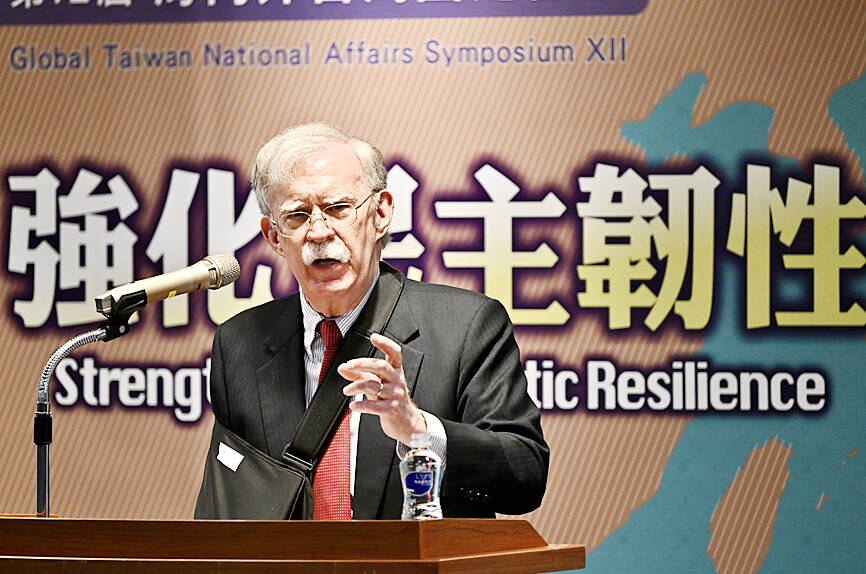The US must warn China of the severe consequences of taking military action against Taiwan, former US national security adviser John Bolton said in Taipei yesterday.
Bolton made the remarks while giving the keynote address at the World Taiwanese Congress’ annual meeting.
He added that the US must work closer with Taiwan and allied countries in Asia on national security to counter Chinese aggression, and ensure that Taiwan remains a free and democratic country.

Photo: George Tsorng, Taipei Times
“People thought Ukraine could not fight, they say it’s just part of Russia historically, whereas in fact, Ukrainians have fought with skill, morale and effectiveness,” said Bolton, who also served as US ambassador to the UN.
It would be the same for Taiwan, he said.
“Will Taiwan fight for its independence?” he asked, as people in the audience shouted: “Yes, we will.”
“That is the right answer,” Bolton said, smiling as people applauded in the conference room.
“That’s what China has to understand, that the people here believe in governing themselves, and they are not going to give it up, and it’s important that is communicated to the US. So when commentators said that Taiwanese are using Americans’ support, but they are not really prepared to defend themselves ... that is wrong. If it came to military action, then Taiwan would fight,” he said.
Bolton criticized politicians and commentators in the US and around the world who he said claim Taiwan is being provocative.
China is the aggressor, always threatening Taiwan and other countries in the region, he said.
“Strength is not provocative; weakness is provocative,” Bolton said.
Weakness is what needs to be avoided in Taiwan, he said, urging the US to help Taiwan to bolster its military capabilities.
“We need to do more to convince [Chinese President] Xi Jinping [習近平], that he cannot prevail” and that an attack on Taiwan would have heavy consequences for China, Bolton said.
The US should recognize Taiwan, he added.
When Taiwan was expelled from the UN in 1971, former US president George H.W. Bush was the US ambassador to the UN and he supported dual recognition, so that Taiwan could keep its seat in the UN, but the idea was rejected by Taiwan and China at the time, Bolton said.
“But now dual recognition makes sense from the US perspective, though it could be displeasing to Bejing, but that’s the point [we must make], to show that relations between the US and Taiwan are fixed, and will not go away,” he said.
Even now in the absence of full recognition, richer strategic dialogues between Taiwanese and US officials are needed, not just between diplomats, but also those in the military and intelligence fields, so that the two national security teams can coordinate, Bolton said.
Other allied countries must also be involved in contingency planning, to assess what China might do and how to respond, he said.
“If an attack takes place, then it’s too late,” he said.
If Taiwan pressed for more national security discussions, it would have a greater chance of deterring Chinese aggression or defending itself, he said.

Intelligence agents have recorded 510,000 instances of “controversial information” being spread online by the Chinese Communist Party (CCP) so far this year, the National Security Bureau (NSB) said in a report yesterday, as it warned of artificial intelligence (AI) being employed to generate destabilizing misinformation. The bureau submitted a written report to the Legislative Yuan in preparation for National Security Bureau Director-General Tsai Ming-yen’s (蔡明彥) appearance before the Foreign Affairs and National Defense Committee today. The CCP has been using cognitive warfare to divide Taiwanese society by commenting on controversial issues such as Taiwan Semiconductor Manufacturing Co’s (TSMC, 台積電) investments in the

INVESTIGATION: The case is the latest instance of a DPP figure being implicated in an espionage network accused of allegedly leaking information to Chinese intelligence Democratic Progressive Party (DPP) member Ho Jen-chieh (何仁傑) was detained and held incommunicado yesterday on suspicion of spying for China during his tenure as assistant to then-minister of foreign affairs Joseph Wu (吳釗燮). The Taipei District Prosecutors’ Office said Ho was implicated during its investigation into alleged spying activities by former Presidential Office consultant Wu Shang-yu (吳尚雨). Prosecutors said there is reason to believe Ho breached the National Security Act (國家安全法) by leaking classified Ministry of Foreign Affairs information to Chinese intelligence. Following interrogation, prosecutors petitioned the Taipei District Court to detain Ho, citing concerns over potential collusion or tampering of evidence. The

‘COMPREHENSIVE PLAN’: Lin Chia-lung said that the government was ready to talk about a variety of issues, including investment in and purchases from the US The National Stabilization Fund (NSF) yesterday announced that it would step in to staunch stock market losses for the ninth time in the nation’s history. An NSF board meeting, originally scheduled for Monday next week, was moved to yesterday after stocks plummeted in the wake of US President Donald Trump’s announcement of 32 percent tariffs on Taiwan on Wednesday last week. Board members voted to support the stock market with the NT$500 billion (US$15.15 billion) fund, with injections of funds to begin as soon as today. The NSF in 2000 injected NT$120 billion to stabilize stocks, the most ever. The lowest amount it

NEGOTIATIONS: Taiwan has good relations with Washington and the outlook for the negotiations looks promising, Minister of Economic Affairs J.W. Kuo said Taiwan’s GDP growth this year is expected to decrease by 0.43 to 1.61 percentage points due to the effects of US tariffs, National Development Council (NDC) Minister Paul Liu (劉鏡清) said at a meeting of the legislature’s Economics Committee in Taipei yesterday, citing a preliminary estimate by a private research institution. Taiwan’s economy would be significantly affected by the 32 percent “reciprocal” tariffs slapped by the US, which took effect yesterday, Liu said, adding that GDP growth could fall below 3 percent and potentially even dip below 2 percent to 1.53 percent this year. The council has commissioned another institution